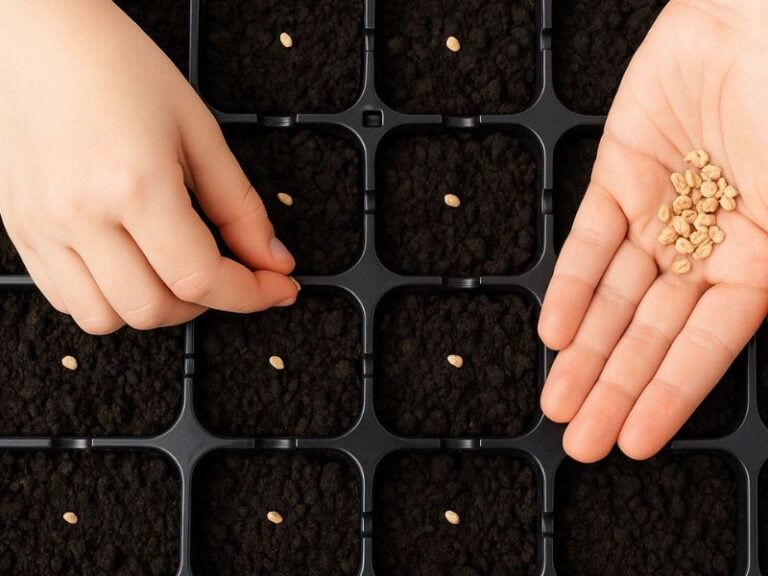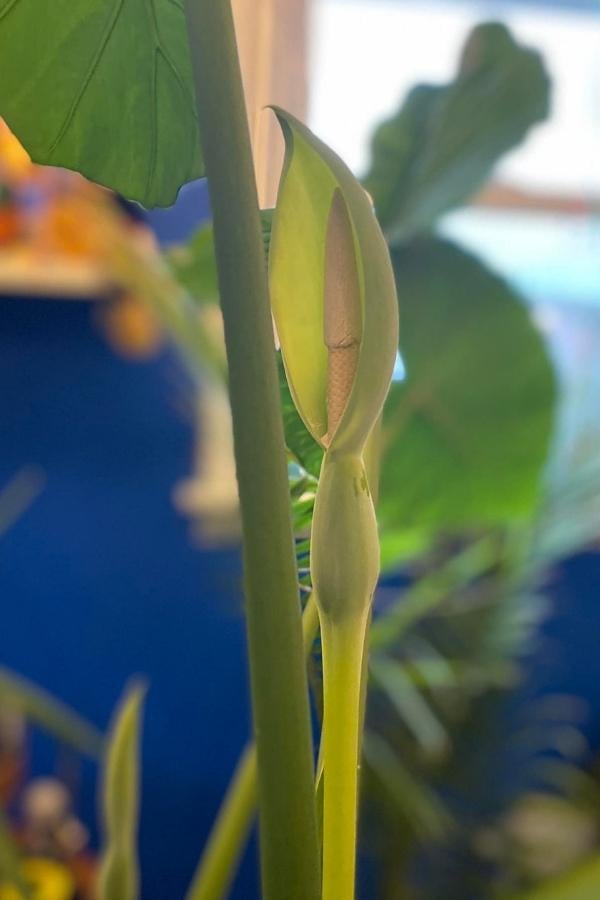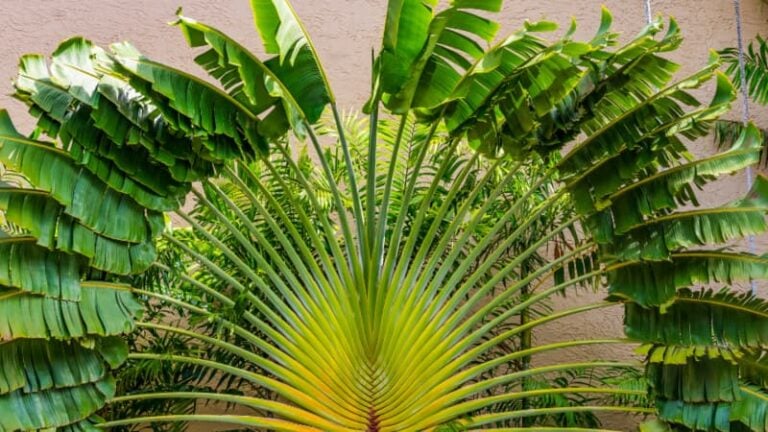Mulch is a gardener’s best-kept secret. It helps conserve soil moisture, stave off weeds, and protect the roots in bright, sunny spots. But it can sometimes smell horrible.
Bad-smelling mulch is often a sign of toxic buildup as a result of anaerobic decay. It is caused by a combination of low oxygen levels and moist conditions. Then, foul-smelling acetic acid, methanol, or hydrogen sulfide accumulates. Fluffing and mixing your mulch to aerate it will help to eliminate the odor.
Contents
- Why Does My Mulch Smell Like Manure?
- Mulch Has Been Left to Become Anaerobic
- Decomposition of Mulch Can Give Off Manure-Like Smell
- Colored and Black Rubber Mulch Can Smell Bad
- How Should Good Mulch Smell?
- How Do I Stop My Mulch from Smelling?
- What Is The Best Natural Mulch?
- Which is the Safest Mulch to Use?
- Can Mulch Smell Make You Sick?
- Should You Remove Old Mulch?
- What Kind of Mulch Smells Good?
Why Does My Mulch Smell Like Manure?

You could be forgiven for thinking your mulch contains manure, especially given how bad it smells.
However, there is no manure in it at all. The sulfuric odor you’re smelling is a sign of anaerobic degradation.
There are two primary causes:
Mulch Has Been Left to Become Anaerobic
If your mulch smells like manure, it’s most likely due to anaerobic conditions in it. You will notice a distinct toxic or sour odor.
It usually smells like rotten eggs, silage, ammonia, or strong vinegar.
This is especially true for commercial manure. It is typically mass-produced and improperly stored.
Perhaps they’re stacked in large piles, sucking the air out of the mulch.
Not only that but most commercial mulch is packed in airtight bags. These actions, when combined, create ideal conditions for anaerobic degradation.
As it decomposes in these anaerobic conditions, it will produce acetic acid or hydrogen sulfide.
That’s what gives off the foul odor. Worse, mulch that decomposes in this manner has an acidic pH.
The pH levels can quickly drop from around pH 6.0 to around 2.0.
Acidic mulch, when combined with toxins such as acetic acid and methanol, can cause more harm than good to your plants.
Decomposition of Mulch Can Give Off Manure-Like Smell
Mulch that smells like manure is almost always the result of decomposition. This is especially true if the mulch is organic.
Mulch decomposition is primarily caused by microbes such as bacteria and fungi.
The usual suspects are Actinomyces. These Actinobacteria thrive in anaerobic environments. They break down organic matter to produce humus, heat, water, and CO2.
These microorganisms can also produce foul-smelling chemicals, but they are extremely rare. That’s what you’d get mixed up with manure.
It should be noted that Actinomyces are an important part of the mulching process.
They aid in the release of nutrients that are beneficial to plants. And, to be honest, their decomposition odor isn’t all that strong.
Colored and Black Rubber Mulch Can Smell Bad
If you use colored mulch, the dye can explain the odor. Typically, red oxide is used to color the mulch. It emits a rust-like odor.
Carbon dyes, on the other hand, are responsible for the black mulch. It doesn’t have a bad odor.
However, old wood treated with chromate copper arsenate can be used as the base material. It’s the preservative that stinks.
Meanwhile, black rubber mulch has a strong odor. It has an odor similar to new tires or sneakers.
Fortunately, the odor will dissipate within 2 to 3 days of installation.
Worse, the rubbery odor may reappear during hot summer days. It can be excruciating.
To make matters worse, the mulch provides no nutritional value to plants.
How Should Good Mulch Smell?
A bad odor coming from mulch is not a good sign. While good mulch may have an odor, it should not be offensive, unpleasant, or overpowering.
If your mulch has a sour, toxic, or rotten odor, consider it a red flag.
A vinegary odor indicates the presence of acetic acid in your mulch. That is never a good thing for your plants. The same is true for any acrid ammonia odor.
Good mulch has the aroma of fresh compost. Or, more commonly, the smell of freshly sawed lumber or sawdust.
Smelling mulch is the best way to determine its quality. If it has a foul odor, it is most likely toxic and unusable in its current state.
If it smells woody, it’s fine and would be beneficial to your plants.
How Do I Stop My Mulch from Smelling?
If you have black rubber mulch, there isn’t much you can do. The revolting odor should dissipate on its own after a few days of mulch placement.
Make sure it is not in direct sunlight or heat. The best way to deal with organic manure is to aerate it. In what way?
Avoid Storing your Mulch in Airtight Bags
In storage, anaerobic decomposition can occur. Poor air circulation, no matter where it’s kept, makes it even worse. As a result, use burlap sacks or open containers.
Check to see if the mulch is well-aerated. Fluffing the materials allows for optimal airflow.
This action aids in the formation of more air pockets in your mulch.
Alternatively, you can spread the unused mulch pile. It should be covered with weed barrier fabric or a roof tarp.
The stack can be held in place with a few rocks or soil staples over the fabric.
Poke a few small holes in the packaging of bagged mulch. Maintain a dry and airy environment.
Mulch can also be stored for a long time by spreading it out on a tarp.
It should be located in a dry, well-ventilated area. This way, it will keep its pleasant smell and freshness for months.
Spread your Mulch Out to Dry
This is the most effective way to eliminate the odor. If your mulch has a sour odor, spread it out in an open area.
Choose a sunny location where the air and sun will eliminate toxins such as acetic acid, methanol, and hydrogen sulfide.
Ensure to turn your mulch often as it airs out.
Fluff Up Your Mulch to Get Rid of Bad Smell
It’s important to mix and spread the mulch before you start fluffing it up. This will increase aeration and cook out the sulfuric odor.
Remember that if mulch decomposes aerobically (in the presence of oxygen), it emits a pleasant odor.
Every month or so, fluff up your mulch. This is especially true if the mulch contains a lot of organic matter.
Poke holes through the mulch for indoor plants. This will allow air into the soil and improve aeration.
When applying the mulch, make sure it’s between two and four inches thick. If it’s too thick, it’ll probably collapse under its own weight.
Furthermore, oxygen will have a difficult time reaching the growing medium.
You shouldn’t use mulch that smells so bad. If it has gone sour, it will cause issues for your plant if you don’t clean up first. Using toxic mulch will cause a variety of symptoms for your plants. These include:
- The leaves first turn yellow
- Leaves appear scorched or burnt
- Loss of growth, vitality, and vigor
- If it hates acidic soil, then your plant will eventually die
What Is The Best Natural Mulch?
The type of plant will influence the mulch you choose. If it’s for a garden, the landscape design will be important as well.
There are two kinds of mulch: organic mulch and inorganic mulch.
Organic mulches are preferred by forward-thinking gardeners. These natural mulches are safe to incorporate into the growing medium.
Some soil-borne microorganisms can break them down into nutrients that your plant can use.
Fortunately, there are many different types of natural mulches.
Each type of mulch has its own set of characteristics, advantages, and disadvantages. Let’s learn more.
Cedar Bark Chips as Mulch
Cedar bark chips are sometimes sold as bark mini nuggets (Check the latest price on Amazon here). They take longer to degrade than shredded bark.
Not great for sloppy landscapes, though, as they don’t stay put.
These chips are an excellent choice for indoor plants and greenhouses.
Best of all, they are available in a range of sizes. Mulch with the biggest nuggets lasts the longest.
Pine Tree Bark/Straws as Mulch

The leaves of certain plants, such as pine, make excellent mulch. They taste even better after being shredded.
As mulch, pine straws, or needles are natural, look great, and last longer.
Pine needles are also abrasive. They will not be washed away in your garden by rain. Pine-based mulch is ideal for acid-loving plants such as hydrangeas, turnips, and azaleas.
Compost Can Be Used as Natural Mulch
The compost is darker, but it appears to be soil. That means it’s ideal for mulching and highlighting your plants. It degrades faster and thus improves soil structure more quickly.
The pros of compost as mulch are endless…
- It’s cheap – some municipalities and local parks give away compost.
- You can make your own at home. You can use leaves, shredded stems, and even grass cuttings.
- It improves soil moisture retention.
- It nourishes your plants through easy-release nutrients
- It improves the organic content of the soil
- It can suppress plant diseases and pests
- It encourages the growth of good microorganisms in the soil
Grass Clippings Can Be Used as Natural Mulch
Using grass cuttings as mulch is an environmentally friendly way to dispose of them. It aids in the retention of water and the control of weeds.
It’s also a good organic fertilizer because it adds potassium and nitrogen to the soil.
Grass clippings used as mulch can also help to keep pests at bay. It’s also reasonably priced.
However, you must not apply more than 1-2 inches of grass mulch at a time.
Build your mulch up to an inch layer at a time. From here, you can increase the thickness to two inches by combining wood chips, dry leaves, or compost in a 2:1 or 1:1 ratio with fresh grass cuttings. (Source: University of Missouri)
Make sure the grass clippings are sufficiently dry. Damp cuttings can dense out and prevent soil aeration. It’ll also create a barrier to moisture from reaching the soil.
Pine Bark Mini Nuggets as Mulch
Pine bark chips (Check the latest price on Amazon here) can also be used as mulch in the form of mini nuggets. They work like cedar bark chips but stay in place. They also last longer.
The mini pine bark nuggets are darker. As a result, they are ideal for landscaping. This mulch, in addition to staying put, helps to retain soil moisture for a longer period of time.
For my container plants, I like to use pine bark as a mulch. This is due in part to the fact that the mulch does not splash when irrigated.
Remember that it is organic and can enrich your plants, reducing the need for frequent fertilizer applications.
This mulch, when used correctly, can help to prevent the spread of pests and soil-borne diseases. I also like how it protects my plants from heat and cold damage.
Cypress Mulch
Cypress mulch is similar to pine straw or needles in appearance. This mulch is frequently inexpensive. Furthermore, as the organic matter decomposes, it feeds the soil.
When it comes to weed control, cypress mulch, in my opinion, shines the brightest. Unfortunately, old and valuable cypress groves are being cut down to make mulch.
This is particularly noticeable in the wetlands of Florida and Louisiana, where they play an important role in storm control.
From an ethical standpoint, I would avoid cypress mulch. Pine mini nuggets would be a better option. However, if the cypress mulch is produced ethically, it makes excellent mulch.
Which is the Safest Mulch to Use?
Almost all of the natural mulches mentioned above are completely safe. They’re organic, inexpensive, and will benefit both your plants and the garden as a whole.
However, avoid cypress mulch that has been obtained in an unethical manner.
Mulch should be applied sparingly. It should be between 2 and 4 inches long. Anything thicker will act as a moisture and air barrier. That is detrimental to your plant.
Under no circumstances should toxic mulch be used! If it smells bad, such as sulfuric, rotten, or vinegarish, treat it first. Fluff the sour mulch and allow it to dry in the open air.
The same is true for colored mulch and black rubber mulch. While some dies are safe, it is always better to be on the safe side. Furthermore, there are no nutritional benefits to using rubber mulch.
Can Mulch Smell Make You Sick?
Yes! Inhaling methanol, acetic acid, sulfur, or hydrogen sulfide can make you sick. That’s because they are toxic chemicals.
Should You Remove Old Mulch?
Yes, you should remove mulch that’s older than a year. The decomposed organic matter holds too much moisture. Therefore, it can result in root rot, which can cause your plant to wither and die.
What Kind of Mulch Smells Good?
Pine bark mini nuggets and pine needles smell good as mulch.






